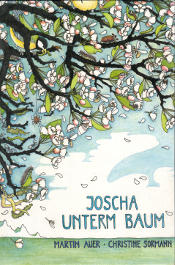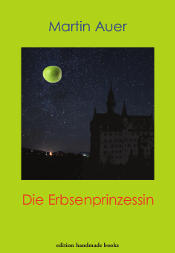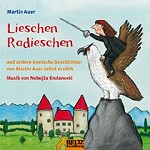Martin Auer: The Strange War, Stories for Peace Education

The Story of a Good King
Please share if you want to help to promote peace!
Original in English by Martin Auer
Reviewed by Nicole Jones
Bücher und CDs von Martin Auer

In meinem Haus in meinem Kopf
Gedichte für Kinder

Die Prinzessin mit dem Bart
 Joscha unterm Baum
Joscha unterm Baum

Was die alte Maiasaura erzählt

Die Erbsenprinzessin

Der wunderbare Zauberer von Oz - Hörbuch zum Download

Die Jagd nach dem Zauberstab, Roman für Kinder - Hörbuch zum Download
 Der seltsame Krieg
Der seltsame KriegGeschichten über Krieg und Frieden

Zum Mars und zurück - Lieder
 Lieblich klingt der Gartenschlauch - Lieder
Lieblich klingt der Gartenschlauch - Lieder

Lieschen Radieschen und andere komische Geschichten - CD
Once there was a good king who ruled his country wisely. The taxes his subjects had to pay he used to have schools and universities built so the young people could learn all the different trades and study all the sciences and thus be able to serve each other better. He also had hospitals built and doctors trained so his subjects should not suffer from sickness more than necessary. He had roads and railways built so the goods that were produced in one part of the country could be quickly delivered to all the other parts of the country where they were needed. He admonished his judges to give just verdicts and he did no allow his officials to accept bribes.
The king also wanted his subjects to live in peace. He especially instructed the school teachers to teach the children to be tolerant and not despise anybody for the colour of their skin or their religion or their culture. Also the children should be taught not to fight when they had a dispute, but to talk things over and settle their quarrels amiably. Every year a great peace festival was held in the capital with music and folk dancing and young people from all over the world being invited.
The king was a nice young man, quiet and modest and gentle. He really could not hurt a fly. He did not dress extravagantly, he did not eat expensive food or drink costly wines, he did not spend the taxpayer's money on pompous palaces or fine horses or fast automobiles. He loved his young wife and in the evenings he sat with his two children and read them bedtime stories. But what he liked to do most was to sit in his study with his books and the reports from all parts of the country and work out new plans to make the life of his subjects even better.
The king was not conceited at all but he was a clear thinker, and when he looked at the reports he got from all parts of the country he had to conclude that he really was ruling the country well and that he was probably the best king the country could ever wish for. He concluded further that no one had reason to wish for another king unless he had some bad intentions, and that anyone who wished to become king in his place could really only plan to use the king's power for selfish reasons.
He told his chief of police: “If anyone wants to be king in my place, it can only be to abuse the king's power, maybe to buy fine horses or to have pompous palaces built or to spend the taxpayer's money on extravagant clothes and jewels or to buy fine horses or fast automobiles. So please look out for such people and keep them from doing the kingdom harm!”
The chief of police actually was an old friend of the king, they had gone to the same school and studied at the same universities. He was also a nice young man who had many good qualities. He did not hate anybody, he did not despise anybody because they dressed differently or spoke another language or believed in a different religion. But his foremost quality was being absolutely loyal to his king. He told his policemen: “We have a very clever and well-meaning king who rules us wisely. He looks after our schools and universities, our hospitals and roads and railways, our law courts and our mail delivery system. These are all very important for our country. But the most important thing for our country's welfare and the well-being of its subjects is for our king to remain king. So look out for anybody who wishes for a different king or even aims at being king himself. Such persons are enemies of the people and must immediately be disposed of.”
The policemen also were nice people who had many good qualities. They loved their families and did not hate anybody. But their foremost quality was to obey their superiors. So they looked out for people who might be enemies of the king and thus enemies of the people. When they heard of someone who said “Well, the new hospital is a really good thing but it should have a larger maternity ward”, they suspected them of criticizing the king and immediately arrested them.
After some time some people started to complain more seriously, saying the police should not arrest people just for uttering a different opinion on hospitals or schools. Of course such persons were dealt with even more harshly. They were thrown into the deepest dungeons and their trials were not held publicly. Ordinary people should not learn that there were so many people criticizing the behaviour of the police. And if someone tried to resist being arrested the policemen could not help using force even though they did not like to do so.
The friends and relatives of the people who had disappeared kept asking questions, so the king made a law that said it was forbidden to criticize the actions of the police. Newspapers were not allowed to write about the arrests or about the people who had disappeared. Among the population the opinions were mixed. Some thought the police were right to watch over the safety of the king because after all he was a really good king and ruled the country wisely. But others thought it was unfair to arrest people and throw them into the deepest dungeons without even a public trial. They also complained that nowadays the king spent more money on the police than on schools and hospitals and roads. And some people now seriously thought the king should be replaced by someone else. When some of these people were arrested the chief of police thought they were too dangerous to be left alive even in the deepest dungeons. His loyalty to the king demanded that he had these ringleaders killed, although he was very reluctant to shed blood. He did not do it himself but ordered his most loyal policemen to do it. The policemen, who were used to obey orders, did not question this decision. They just did their duty.
Now people started to fear for their lives and many who were opposed to the way the country was run fled to neighbouring states.
You can guess what happened next. The chief of police feared the people who opposed the king would gather in the neighbouring countries and raise an army and come back to conquer the country and overthrow the king. So even more of the taxpayer's money was spent on strengthening the army and buying more weapons and employing more secret service agents to spy on the neighbouring countries.
And of course the neighbouring countries became afraid and prepared to defend themselves.
So one day the nice young king had no other choice but to declare war on his neighbours and the loyal chief of police had no other choice but to lead the army into battle and all the nice young men who had been taught to be tolerant and respectful towards others had no choice but to take their guns and march over the border and shoot at the nice young men on the other side before the others shot at them.
Author's comments
This site has content self published by registered users. If you notice anything that looks like spam or abuse, please contact the author.
